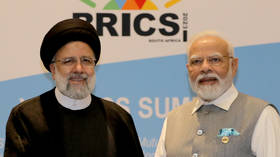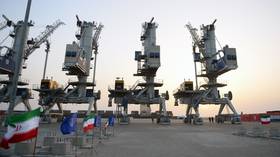Modi ‘shocked’ by Iranian president’s death

India stands with Iran in its time of sorrow, the country’s Prime Minister Narendra Modi asserted on Monday in response to the death of President Ebrahim Raisi in a helicopter accident.
Raisi, 63, and his entire entourage, including Foreign Minister Hossein Amir-Abdollahian and Malek Rahmati, governor of Iran’s East Azerbaijan province, died in the accident. The Iranian leader had embarked on the trip after joining Azerbaijan’s President Ilham Aliyev on Saturday to inaugurate a dam.
Modi, posting on X (formerly Twitter), said he was “shocked and saddened” by Raisi’s demise, and added that his contribution to strengthening New Delhi’s bilateral relationship with Tehran “will always be remembered.”
When the first reports of Raisi’s helicopter crash surfaced on Saturday, the Indian PM said he was “deeply concerned.” “We stand in solidarity with the Iranian people in this hour of distress,” he wrote.
Deeply saddened and shocked by the tragic demise of Dr. Seyed Ebrahim Raisi, President of the Islamic Republic of Iran. His contribution to strengthening India-Iran bilateral relationship will always be remembered. My heartfelt condolences to his family and the people of Iran.…
— Narendra Modi (@narendramodi) May 20, 2024
In November last year, Modi discussed the turbulence in the Middle East and the conflict between Israel and Hamas. Modi expressed “deep concern at the terrorist incidents, violence and loss of civilian lives” while also reiterating India’s “longstanding and consistent position” on the Israel-Palestine issue. Both leaders also emphasized the need to prevent escalation, ensure continued humanitarian aid, and work towards the restoration of peace and stability.
Indian Foreign Minister Subhramanyam Jaishankar on Monday also took to X to express his condolences, recalling his “many meetings” with Raisi and Iran’s foreign minister, with the most recent taking place in January of this year.
Jaishankar travelled to Iran to discuss the volatile situation in the Red Sea and Gulf of Aden shipping lanes, which have come under attack from Houthi rebels, allegedly backed by Tehran. He also held talks on Chabahar Port, as the two countries have been working on a strategic logistics and infrastructure project since 2018.
Last week, New Delhi and Tehran signed a 10-year deal allowing India to operate the port, which is seen as a gateway for unlocking India’s trade potential with Iran, Afghanistan, the Central Asian countries, Russia and Europe. The development of Chabahar is also vital for the North-South Transport Corridor (INSTC), an alternative shipping route envisioned by New Delhi, Tehran, and Moscow.
The long-term deal, seen by New Delhi as benefitting the entire region, hasn’t gone unnoticed by India’s partners in the West. Hours after it was inked, the US State Department warned that anyone cooperating with Iran needs to “be aware of the potential risk that they are opening themselves up to.”
Reacting to the statement, Jaishankar suggested Washington should not take “a narrow view” of the project. The diplomat pointed out that the US has previously been “appreciative” of the fact that the port of Chabahar has “a larger relevance.”
Where India Meets Russia – We are now on WhatsApp! Follow and share RT India in English and in Hindi













